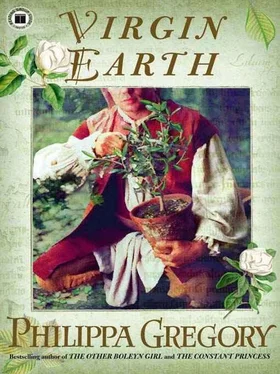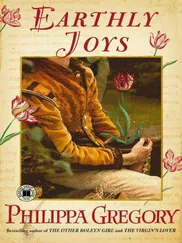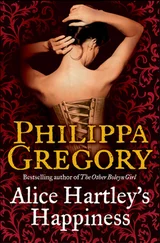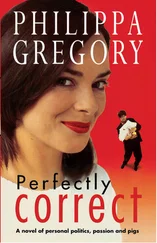Hester had ordered in a dinner from the nearby bake-house and Alexander’s apprentices, his family from Herefordshire, and his friends from the City drank to his memory, ate their dinner and then left.
The house was oddly silent without the tapping of hammers from the yard and continual rasp of the saws.
“Have you thought what you would like to do?” John asked his daughter gently. “Have you thought where you would like to live? Alexander left you well-provided, and you can sell this house. The sale of the business is already agreed.”
“I had thought,” she said. “If you would allow it – I should like to come home.”
“To the Ark?”
“Yes.”
John found that he was beaming with delight. “That would give me much joy,” he said simply.
In early September John was wakened at dawn by the noise of the rising wind.
“I’m glad I’m not at sea today,” he said to Hester.
He went to the window and saw the trees in the orchard and the avenue flailing their boughs at the sky where the clouds raced overhead.
“Come back to bed,” Hester said sleepily.
There was a clatter from the stable yard.
“I’m awake now,” John said. “I’ll get up and see that everything’s safe. We’re in for a storm.”
He spent the day with the lad and Joseph pinning back the creepers and staking the plants which were already rocking in the earth, pulling at their roots. Frances took a sharp knife and went around the garden mercilessly pruning the climbing roses so the long boughs would not tear the stalks from the soil. She came in for dinner at midday with her arms scratched above her gloves and her hair tumbled about her shoulders.
“Frances Norman,” said Hester, disapprovingly.
“It’s wild out there,” Frances said. “My cap blew off.”
“I can see that,” Hester said.
“We’re going to lose half the apples,” John said irritably. “What a foul wind.”
“And the plums,” Frances said. “I’ll pick as many as I can get this afternoon.”
“I’ll come out and help,” said Hester. “I don’t expect any visitors this afternoon, no one would take a boat on the river unless they had to.”
John had thought that the wind might drop as night fell; but it grew stronger and wilder, and it started to rain. Hester went round the house fastening shutters but still they could hear the thud of the wind against the leaded panes of glass, and in the rarities room they could see the great panes creaking as they moved in their frames.
“I hope to God they don’t crack,” John said. “We’ll close the shutters behind them, then at least if they smash the rarities will still have some protection. If I had thought I could have boarded up the house this morning.”
They had an ill-cooked supper. A great gust of wind had come down the chimney and blown soot all around the kitchen. While they ate they heard the clatter of a slate falling from the roof into the stable yard.
Frances declared that she was going early to bed and putting her head under her pillow, and Hester followed her example; but John prowled around the creaking house for half the night, feeling that his Ark was rocking in high seas and that the master should be awake.
In the morning there was less damage than they had feared. The Virginian creeper was stripped of its rosy leaves and would make no show to attract buyers, and there were fallen fruit and broken boughs all down the orchard. The chestnuts had been ripped from the trees too early and they might not ripen, and they had lost most of the apple and plum crop. But the house was still standing and the windows were unbroken, and only a few slates had gone missing from the roof.
“I shall go into Lambeth and order the builder to come,” John said. “He’ll be a busy man this day, I should think.”
He rode Caesar down the lane to Lambeth and thought that the crowd in the market was agog with news of the storm damage until he drew closer and heard what they were saying.
“What was that?” he asked, dropping from the saddle. “What did you say, sir?”
“Don’t you know?” A man turned to him, delighted to be first with the news. “Haven’t you heard? He’s dead!”
“Who?”
“The Lord Protector. Oliver Cromwell. Dead in his bed while the storm rattled the roof above him.”
“It’s as if God himself was angry,” a man piously asserted. “It was a sign.”
“A very odd sign then, and rather late in the day,” John said crossly. “If God didn’t like Oliver Cromwell he had plenty of time to demonstrate that before.”
An unfriendly face turned toward him. “Are you one of his old soldiers?” someone asked unpleasantly. “Or a servant of the major generals? Or one of the damned tax collectors?”
“I’m a man who thinks for himself,” John said stoutly. “I serve no master and I owe nothing to any man. And I am absolutely certain that God didn’t blow the slates of my roof last night to show me that Oliver Cromwell was dying. If He is all-wise, then He might have found a way to tell me that didn’t let the rain in.”
The storm which blew Oliver Cromwell up to his reward in heaven, or down to the devils in hell, did not helpfully indicate his successor. There were many who said that he nominated his son Richard on his deathbed, but John, recalling what his father had said about the succession of kings, remembered that courtiers were never very reliable about deathbed confessions, and that the power of supreme government in England might go to whatever man had the courage to seize it.
The man most fit to succeed was John Lambert, beloved of the army, still the greatest power in the land, and a proven friend of peace, tolerance and reform. But Richard was said to be the heir and a new parliament was summoned to rule with the new Protector.
They were curiously churlish about the job. Richard was not even recognized as Lord Protector until they were forced to acknowledge him so that he could send the fleet to the Baltic to protect English shipping against the Dutch in February. And then in April, the army, impatient with being ignored while they petitioned for back pay, and furious at the increasingly arrogant behavior of the royalists, locked the MPs out of the Commons, Richard among them.
He might be a Cromwell, but he was not an old soldier, and the army suspected that the new breed of politicians and leaders had lost the godliness and republican fire of those who had been forced to fight for their beliefs.
John had promised Hester that he would take her to see Lambert’s orange garden at Wimbledon in the spring. They took a boat to the manor house landing stage and walked through Lambert’s new plantation to the formal gardens before the house. John hesitated when he saw Lord Lambert on the terrace, his wife beside him. Before them were a couple of soldiers with the standard of his old regiment which had been given to Cromwell’s son-in-law.
“What’s going on?” Hester asked her husband quietly.
John shook his head.
“Perhaps we should just wave and go back to the plantation,” Hester suggested tactfully. “It’s maybe a private matter.”
“He’s beckoning us,” John said. “Come on.”
The Tradescants went to the foot of the steps. John Lambert smiled down at Hester with a beam that reminded her poignantly of Johnnie when he had just got his own way in an argument.
“You come at a good moment,” he said to them both. “See. Here’s the standard of my regiment. Restored to me.”
“Restored?” Hester asked, coming up the steps and dropping a little curtsy to Lady Lambert.
“Fauconberg and the rest are dismissed from their posts, and so my lads have come to restore the standard to me. We’re together again.”
Читать дальше
Конец ознакомительного отрывка
Купить книгу












